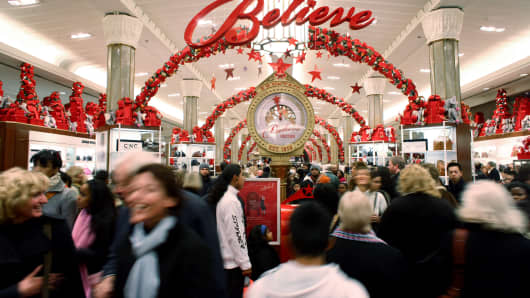So far the signals have been mixed. A report from MasterCard Advisors SpendingPulse last week projected that retailers saw the weakest sales growth since 2008, but others have been a bit more optimistic, including the retailers' own trade group, the National Retail Federation. NRF President Matthew Shay said a week ago that he still predicts a 4.1 percent jump in holiday sales. While that gain would be weaker than the 2011 holiday season, it still would outpace the average annual growth over the past decade. (Read More: Did the Grinch Steal the Holiday Shopping Season?)
The two views are not directly comparable but they do give a hint of the mixed signals that exist.
One problem is the holiday season was marred by a steady stream of negative news. In the weeks ahead of Thanksgiving, residents in the heavily populated Northeast were dealt a heavy blow by the storm Sandy. Then December was marked by the tragic school shooting at Sandy Hook Elementary School.
As the final days before Christmas approached, when consumers traditionally rush out to make last-minute purchases, the headlines in the news about the "fiscal cliff" forced shoppers to reflect on their own financial situation. With all of this weighing on consumers, it is easy to understand why many were not in the mood to make impulse purchases as they shopped for their holiday gifts.
(Read More: Naughty or Nice Holiday? Online Sales May Decide)
Deutsche Bank retail industry analyst Charles Grom Wednesday cut his estimates for chain-store sales across the board, citing his observation that consumers became "frozen" in the face of the "cliff" debates, which they expected would reduce their disposable income in 2013 and beyond.
"What's interesting is this fear spans just about every income demographic in our coverage group," Grom said in a research note. He expects to see the lowest two-year stacked monthly sales gain in two years among broadline retailers – a group that includes companies such as Target, Macy's and Kohl's.
(Read More: Shoppers Are Left Dangling on the 'Fiscal Cliff')
Still, there were some pockets of strength. Shoppers scooped up tablet computers and fashion, especially for accessories and footwear, which could be used to freshen up a person's "look," according to Tom Johnson, a principal in PriceWaterhouseCooper's Retail & Consumer practice.
Headlines surrounding the "fiscal cliff" likely made consumers more cautious, Johnson said. However, he said he is an "optimist" regarding consumers and the retail sector.
In fact, he said that the biggest problem retailers may have faced this holiday season was their management of inventory.
"There was a shortage of inventory or the wrong inventory," Johnson said. He blamed the problem on "bad guesses and inventory management" that may have resulted from retailers either being too optimistic about consumer spending levels or from not watching their category enough to spot the big trends.
Grom also noted that despite "lean inventory in most cases," there did appear to be a "modestly stepped up" level of markdowns at stores that could hurt profit margins in the fiscal fourth quarter.
That's one reason why Grom expects to see a number of earnings revisions being issued by retailers.
Other sectors were particularly hard-hit. Toy sales were weak and so were outwear sales, which suffered from warm weather during parts of December.
Although Jefferies downgraded retailers such as American Eagle, AnnTaylor and Skullcandy Wednesday, the firm said it remains positive on retail stocks heading into 2013. The analysts cited an improving consumer environment, "still attractive" stock valuations and "margin tailwinds" in the first half of the year for their opinion.
One factor that should help consumer spending is healthier housing and job markets, according to Jefferies.
Johnson said the improved housing outlook could lead to higher levels of consumer spending on home furnishing and remodeling. He also expects auto sales to be strong this year as many consumers will either be forced to purchase a new car, or will be encouraged to buy a new car by new vehicle technologies that are being released this year.





